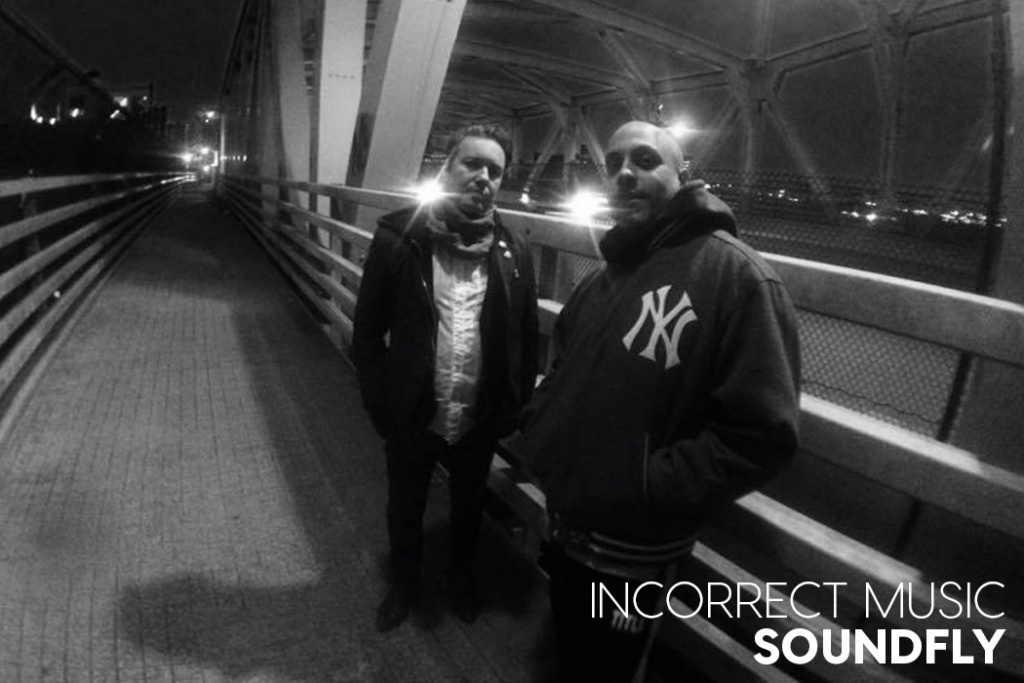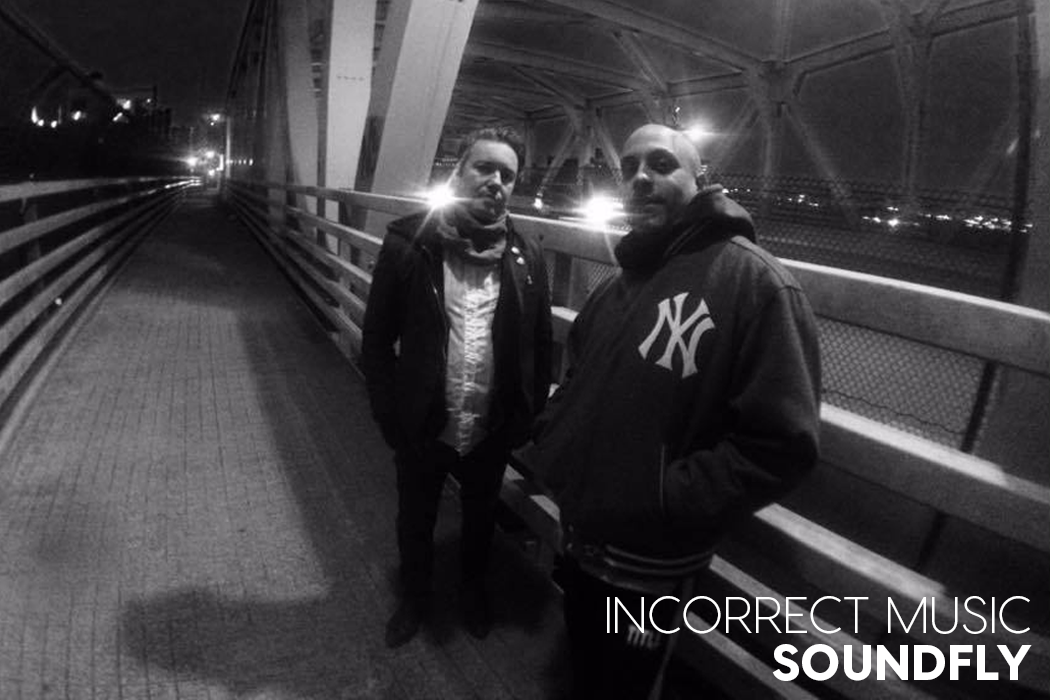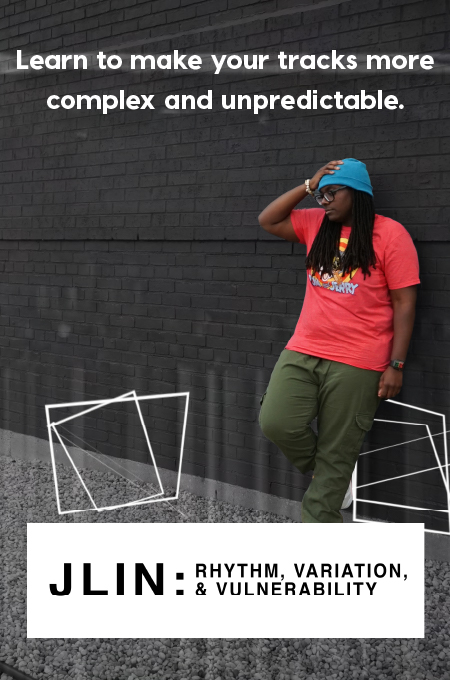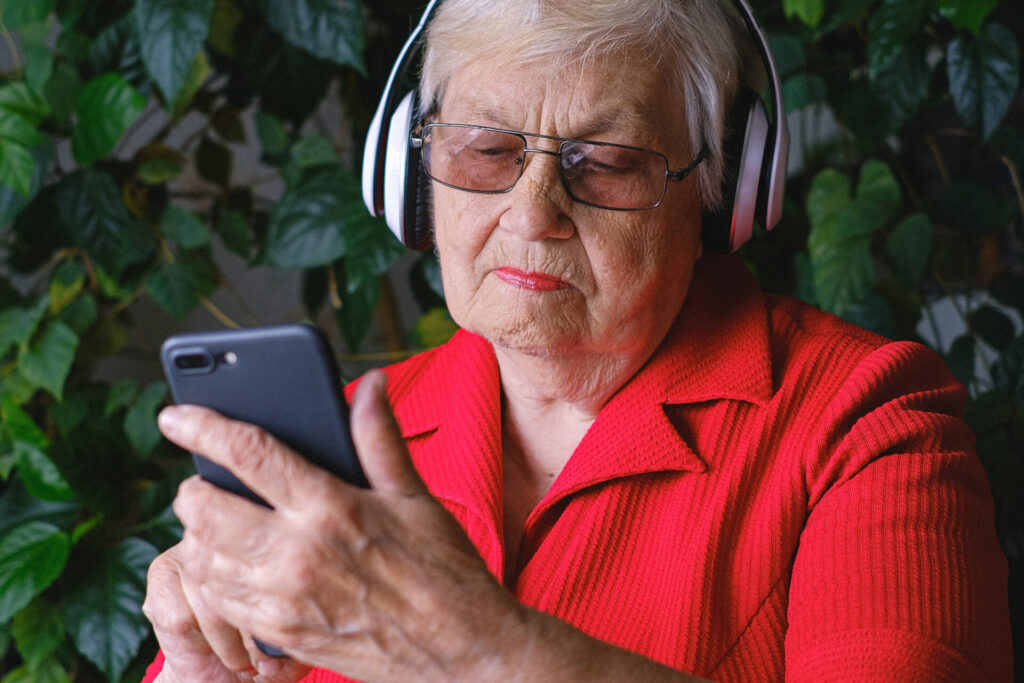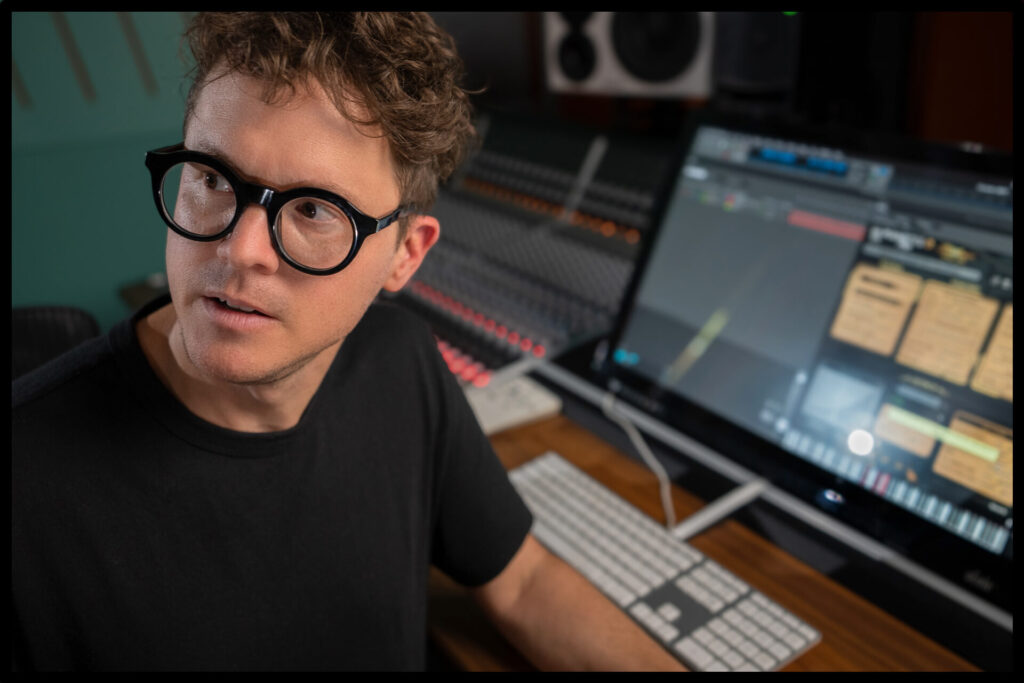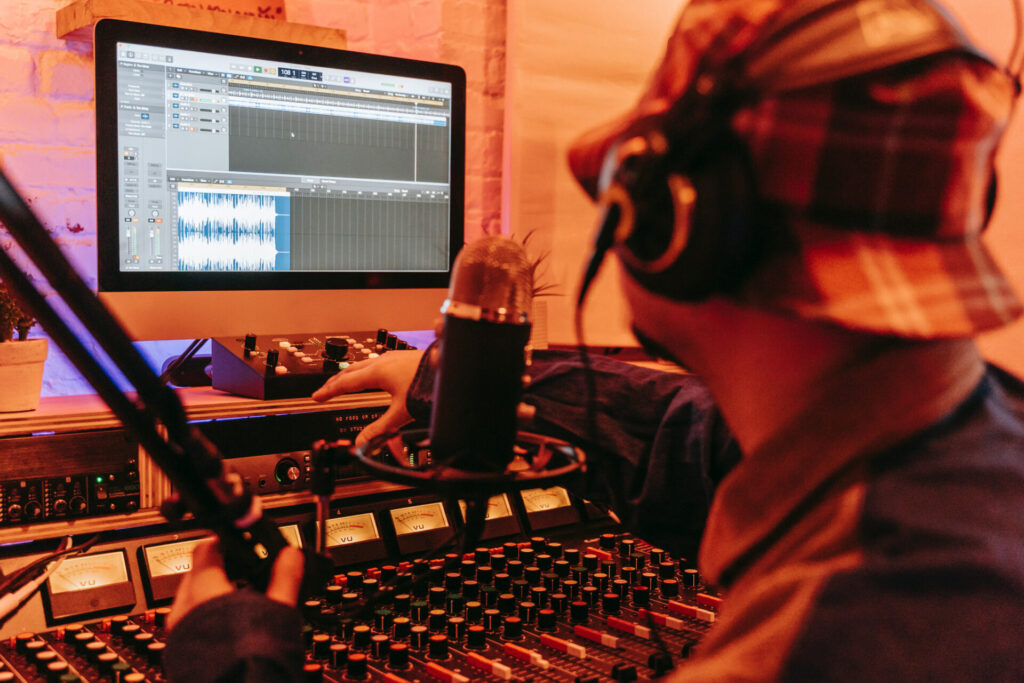Welcome back to Soundfly’s new interview series, Incorrect Music, curated by guitarist, singer, and composer Lora-Faye Åshuvud (of the band Arthur Moon). In this series, we present intimate conversations with artists who are striving to push the boundaries of their process and craft.
Alap Momin (dälek) and Jan Johansen (Glorybox) are the team behind the newly minted Third Culture Kings, a genre-nonconforming duo who wrote and recorded their debut album, Is That Light You Carry?, almost entirely on an iPhone! While there’s certainly something “incorrect” about the refusal to adhere to the trappings and traditions of music genre, it is in their home-brewed production technique where Third Culture Kings truly subvert the norm.
Momin uses the term “wrong” to describe his productions, which heavily feature the iPhone voice memo and other “bad equipment” in an attempt to cure his boredom with the pristine-sounding technologies available to anyone looking to record these days. “Everything is so clean and perfect now,” he says, so 3CK makes music that celebrates the “sloppy and muddy and hissy” instead.
Third Culture Kings’ Is That Light You Carry? is out now via 100.000/Internet & Weed.
– Lora-Faye Åshuvud
Interview by Max Alper
Both of you are quite well-known in your fields individually. When and how did you find each other, and how did this collaborative project come together?
In touring Europe with my old group dälek, I met Emil and the Serena Maneesh cats. Jan is tight with them and their tour manager Ben. Through Ben, we ended up being introduced to each other at Roskilde Festival in Denmark. Then, later that year, we happened to be playing a show in Christiana in Copenhagen, and Jan was walking past the venue when we were soundchecking. He looked up and saw me in the doorway and I told him and his crew to come up and chill. We had an incredible night but never saw each other again after that.
That was back in 2005. He happened to be in New York in 2013 and hit me up that we should do a collab while he was in the city. Both of us had quit our older groups and were looking for new ways to create and express ourselves, so it couldn’t have been better timing.
Considering how modern electronic production played such a crucial part in the creation of Is That Light You Carry?, could you name a few specific artists who may have directly impacted the creation of this record’s diverse soundscape?
Absolutely! Here’s a bunch: DJ Rashad, J Dilla, Jai Paul, DJ Screw, King Tubby, Prince Jammy, Ali Akbar Khan, Byrell The Great, Mike Q, Divoli S’vere, Beyonce, Drake, the Weeknd, Frank Ocean, Dagar Brothers, the Flamingos, Phil Spector, Brian Wilson, Vangelis, Giorgio Moroder, Nile Rodgers, Diplo, Kanye, Noah40, Mike Dean, Pink Floyd, John Lennon, Bo Diddley, Chuck Berry, Fats Domino, Reverend Louis Overstreet, Jimmie Lee Robinson, Maxo Kream, Spacemen3, Velvet Underground, Suicide, Bob Dylan, Leonard Cohen, Rick Ross, Lil Wayne, JJ Cale, Bohannon, William Onyeabor, Madonna, Lisa Lisa, Shannon, Marc Romboy, Rhythm & Sound.
+ Learn more with Soundfly: Interested in learning more about pro-audio mixing techniques? We’re launching a new mentor-driven course featuring input from today’s leading sound engineers called Faders Up: Modern Mix Techniques on October 4. Sign up now, and get $200 off the course with the discount code below!
What’s the story behind the production on this record? Was your choice to create the majority of the record via standard mobile devices simply a utilitarian choice between two musicians in different parts of the world?
No, I got my first iPad in 2009 and started touring with just that and an MPC3000. After a bunch of tours, I started feeling like the iPad was much more musical for me than a laptop. It had the strengths of the computer with the feel of hardware for me. I have been a recording engineer since 1993, and I think I have always viewed the computer as an engineering, mixing, and editing tool. I never felt very musical on a computer. The iPad brought back that missing musicality for me.
Then, in 2011, I got an iPhone, and it was even sicker than the iPad because its always with me. So I very quickly started making beats, cutting samples, and writing hooks and melodies all day and night on my phone. When I would work with an artist or on my own music, I would just go through old riddims or sketches I had on my phone and track them into Ableton and could literally finish a full song in 15 minutes to an hour. I started to feel freer working this way as well as faster and less labored.
So when I met Jan in 2013 to start the record, I already had the beats in various apps on my phone. He would come to the studio once a week and play a riff and hum a vocal melody. I’d pull up a beat and play it for him. If he felt it, then we literally just tracked in the beat from my phone as well as the guitar direct and his vocal. Those became the foundation elements.
Then, I went through my phone looking for samples and melodies for overdubs. I would then track those into Ableton from my phone. Jan, in the meantime, would record vibraphone, trumpet, Fender Rhodes, guitar overdubs, backing vocals, etc. right to voice memo on his iPhone and email the files to me. I’d just drop his parts into Ableton, and then we would edit it all down together to make sense.
So basically the only “real” elements tracking wise are his first guitar, which went direct, and his lead vocals. Everything else is made on iPhone and iPad. People still don’t get for some reason how great the mic and compression sound on the iPhone. You really don’t need anything else!
It’s true that digital instrument apps have become just as powerful as our expensive MIDI VSTs, i.e., Steve Lacy of recent Kendrick Lamar DAMN. fame. Do you see the age we live in as perhaps a turning point for how your typical musician creates their own sound from scratch using the resources available to them?
ABSOLUTELY! As I mentioned above, the computer never felt musical enough for me. The funny thing is, being so hardcore iPad/iPhone for eight years, I can express myself with anything now, but it’s because of the confidence and experience I’ve had with my phone.
I also think that for any musician under 30, any sound can be hot. And that’s really liberating as an older musician. So, yes, I think we are totally at a turning point and more and more people will start to see that you don’t need much but something to say.
I saw that Kendrick producer only uses his phone as well; he’s 18, so I think a lot of people his age will really go for it. But, like I said, I’ve been making about 95% of my music strictly from my phone for eight years now — it still feels like people don’t get it or take it seriously.
I came from cutting tape with razor blades and spending eight hours to get a kick drum to sound good. Let me tell you, you’re sleeping if you don’t mess with the iPhone.
The most consistent word that comes to mind describing this record is “unclassifiable.” Even “experimental” carries too much of a connotation that can pigeonhole an artist. Considering how diverse this record is from track to track, do either of you have a conscious style in mind when composing in this project, even if it’s simply a sound you’re trying to avoid?
Great question. I’ve always sort of had my own signature sound and style in my old groups prior to 3CK. The difference is that I was younger in those groups, so my influences were wide but still limited to maybe more underground or experimental sounds. I got burnt out on that eight years ago and quit my old projects and actively started working with younger musicians and producers who worked in a completely different style from myself.
I was always a sample and “cut-and-paste” cat, typical NYC style. But I got super into synthesis and programming, club music, vogue, pop, modern R&B, etc. over the past decade. So, suddenly, I’m fusing in elements of Justin Bieber over some super experimental, say, Throbbing Gristle vibes but all the while trying to write a song that has the weight of Neil Diamond or Leonard Cohen.
Jan is an amazing songwriter and an awesome singer and guitar player. He just gets it. So for 3CK, it was great to be able to fuse our old underground selves with a whole new pop- and R&B-loving side. Everything was super organic, but at the same time, we definitely had pretty set parameters. We both wanted to keep the record as minimal as possible since we both had come out of that whole ’90s, wall-of-sound thing.
We also wanted to use sounds that we specifically would have avoided in our youth — Madonna, Phil Collins, as well as new records from Beyoncé, Drake, Kanye type of thing. I have maintained from the beginning that, to me, 3CK is a pop project.
+ Learn more on Soundfly: Any sound can fit into a piece of music. Learn how to sample the sounds of the world in your DAW with Making Music From Everyday Items, a free course instructed by YouTube star beat-maker Andrew Huang.
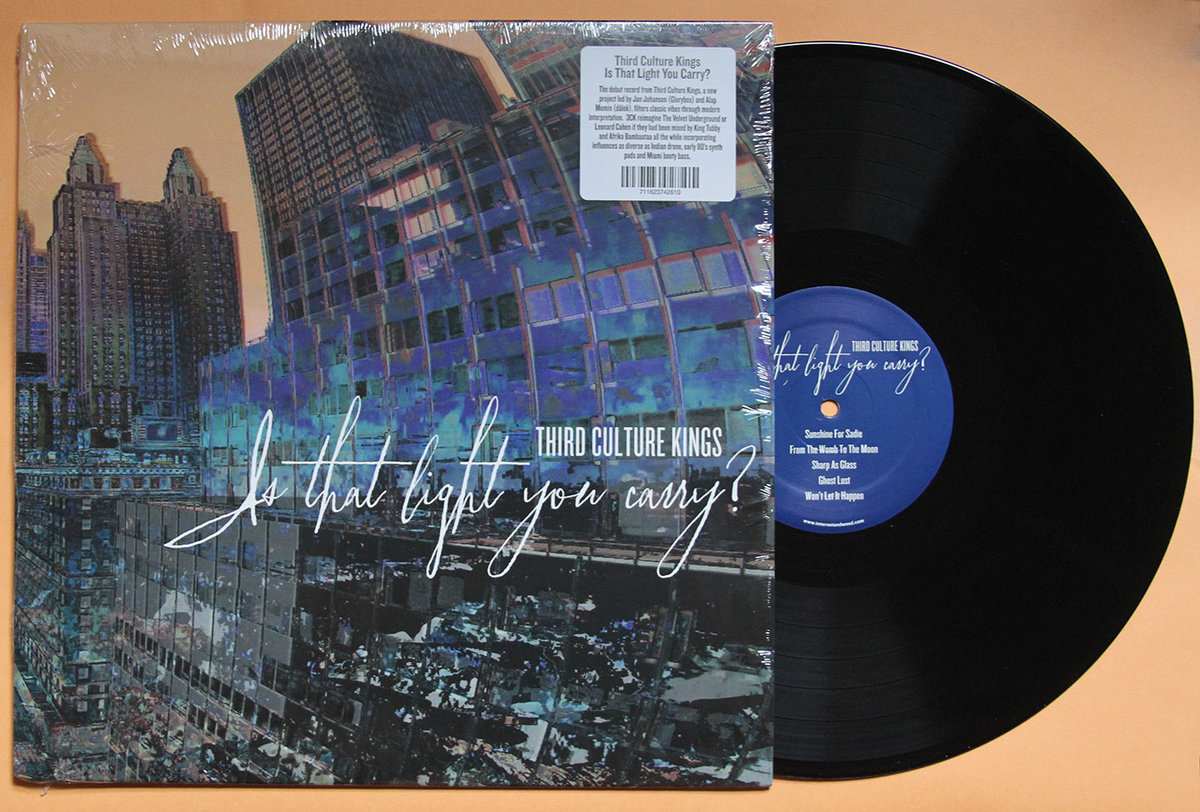
What do you do that you consider to be wholly your own thing?
I can definitely say drone is my own thing. It’s been in my hardcore and punk bands, it’s been in my hip-hop productions. It’s made its way into my club/dance-floor projects. I’ve moved the drone from the mid-range to the subs, but it’s still the same drone, just way cooler now.
I think Jan’s thing is his incredible sense of melody. He is of Faroese descent, and for some reason I’ve made records with an abnormally large amount of Faroese artists. I’ve noticed all of them have this sort of ancestral, ancient harmonic and melodic perspective that is totally unique to the culture of their island. It’s not even typical of other Scandinavian harmonics, either. But what makes Jan even more unique is that he’s lived all over the world, so I hear that root Faroese thing fused with John Lennon, Pet Shop Boys, Britpop, Simon & Garfunkel, etc. So, it’s really even more his thing!
At Soundfly, we love to use the term “Incorrect Music” to describe the things an artist does that go against people’s assumptions, or even their own instincts, but which yield exciting and unique results. What about your music might you consider to be “incorrect”?
So awesome! I have been using the term “wrong” to describe all my productions post-2010. With my old groups we were “experimental” or “noise,” but it was still such a literal category our sound could fit in. Now, I think my perspectives have really opened up and I’ve started incorporating so much more into my sound that it really sounds “wrong” at times.
I’ve also just stopped caring about proper mixing or anything like that. I sort of never cared, but I had pretty bad equipment for the first 15 years of my recording career that I was using to fight to make things sound “good.” But, again, the iPhone makes everything sound good. My Apogee converters are super clean, my boutique mic preamps sound incredible, so everything just sounds “pro” these days.
I’m bored with that. I tend to record things very sloppily. Sometimes I use toy or karaoke mics ’cause everything is so clean and perfect now. But mostly I just use the voice memo on my iPhone. That always gives me great results. I can hear the air and hiss around whatever I’m recording and then I can tame that or bring that out more if necessary.
I would say the most incorrect or wrong thing on our album is Jan’s vocal and guitar treatments. I mean, it’s so sloppy and muddy and hissy, but then you got that slick sub, or 909 claps, or synth pads underneath so its like, wow this sounds HUGE, but definitely “wrong.”
With the birth of “SoundCloud Rap” in recent years, we’ve seen a huge uptick online in what many might consider intentionally underproduced music, one where distorted 808s and clipping masters reign supreme over “refined” production techniques. While many of these URL originators claim to have made the sound by accident as just a way to hear their 808s over built-in laptop speakers, this noisy sound is clearly taking off beyond these niche online communities and into the hip-hop mainstream. As two musicians who have both intentionally dabbled in everything from harsh noise to hip-hop, what are your thoughts on these new trends? How might they compare to the “noise rap” groups of the late aughts such as Death Grips, Clipping., and BLACKIE?
I love SoundCloud Rap for sure! To be honest, I think its wayyyyyy cooler than noise rap from the ’00s. A lot of that stuff is cool, but for me, it feels a bit been there, done that. I quit dälek in 2010 because I started hearing our noise influence in commercial rap and R&B, so it really felt like mission accomplished. My Dark Twisted Fantasy and Yeezus by Kanye both had dälekisms that I loved and thought were fresh. I even heard a bit of our vibes on those early the Weeknd mix tapes and Beyoncé’s last two records.
What I loved about all the commercial versions of my old sound was that they had figured out a way to sell this stuff to the mainstream. It’s incredible to me! I live in Harlem, and everyday, I hear super heavy/noisy/ambient R&B/trap/pop that could’ve been considered experimental when I was doing that stuff, but now it’s commercial — so amazing to watch nine-year-old girls on the basketball court out here doing sick routines to super distorted, noisy tracks! It’s everything I wanted when I started making “experimental hip-hop” in 1995!
People don’t realize dälek was dropping stuff that sounded like Yeezus when Wu Tang was dropping their second album. It was so far ahead of the game that no one was into it. I didn’t want noise rap to stay underground for a bunch of white, male, Wired magazine readers. No offense; I wanted young black youth to grab that shit and run with it. That’s what they are doing and have been doing for the past 10 years.
I work with all hood rappers from Brooklyn, Bronx, Queens, and Harlem, and they’re all under 20 and some are even gang members. I love “old skool” and always will, but I have never been a purist at all in any types of music. Especially not hip-hop.
Hip-hop began as a non-purist art form, like you literally can’t make rap music if you’re a purist. So everything I’ve been hearing on SoundCloud for the past decade is fire to me!
+ Read more on Flypaper: “Unsung: In Praise of Rap’s Studio Musicians”
Do you think it’s possible for ambient and drone music to find similar acceptance from the mainstream pop and hip-hop world?
Yeah, definitely. It already is. Not sure if you’re hearing what’s happening, but for over a decade now, American mainstream pop, R&B, and hip-hop has been getting noisier, more experimental, and ambient. I mean, Drake had that single like seven years ago where the outro was a four-minute ambient piece. It literally sounded like dälek, except cats were bumpin’ it on Hot97 instead of WFMU!
It’s amazing. I haven’t really listened to any underground music, or “band music,” in almost 10 years. I’m strictly pop and R&B these days. Most of that stuff is being driven by black men and women, and I’ve also been obsessed with club music and vogue which is predominantly gay/trans-driven. All this stuff makes me wanna go off like I felt about punk or metal or old-skool hip-hop when I was a teenager. It just happens to all be mainstream and from non-white, non-straight male perspectives, so I think it’s much more universal than “experimental.”
The sounds you hear on 3CK and what I’m doing with various other projects and collaborations on my Internet & Weed label are what I call “Womb Music” and “Dubbed, Drugged, & Ghosted.” Womb Music is literally from all the women I’ve worked with in the past 20 years and really having to work a million times harder to impress them in the studio. Haha! Guys are easy: Just make it loud!
What would be your advice for young, emerging artists looking forward in their careers?
Hmm, rough one. I never really started doing music to be rich and famous or to even really have a career. I think the reason I’ve always had a signature sound and vibe is because I need music the way we all need to breathe. I would be in jail or dead if I didn’t have the ability to get my thoughts or feelings out through sound, rhythm, and melody. So as for a career, mine has been all over the place.
In that case, I guess my only advice could be to just be you. Don’t worry about making it or getting a million followers. I’ve always said if you make an undeniable product, the right people will find you. Here are my two basic rules for finding success in anything you do in your life:
1. You gotta start somewhere.
2. You can never stop.
Looking to advance your skills and open up more opportunities in music? Explore Soundfly’s growing array of Mainstage courses that feature personal support and mentorship from experienced professionals in the field, such as Beat Making in Ableton Live, Orchestration for Strings, Unlocking the Emotional Power of Chords, The New Songwriter’s Workshop, and Crowdfunding for Musicians. Sign up for any course before October 4 and get $200 (40%) off with code LASTCHANCE.
